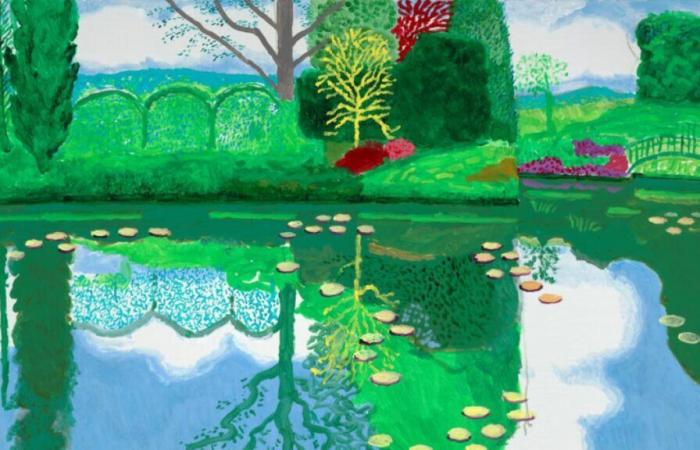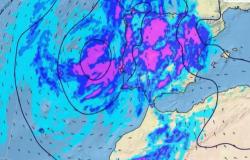The incandescent painting of Hockney sweeps the Fondation Louis Vuitton at the gates of the Boulogne Bois in Paris. A surprise. David Hockney’s path today visualizes the greatest international presence of British art. Formed in the London Royal College of Art, he was soon dazzled by chromatism and the sharp figuration of pop art, an art of recovery of urban everyday life, with ironic key trigger tempered by a curious emotional chord, to deny it. Decored by the lacerating figures of Francis Bacon and his struggle with blood against the brutality of the events, a providential sardonic vein already announced in its beginnings the powerful, personalized drift, which sharpened the versatile look of Hockney: the group portrait, the graphic biography and the fantasized landscape. Their early efforts rebuild images of popular culture, true, that translate into an immediate visual projection. Soon the New York experience, the provocative ductility of graffiti and the bold jump to California will arrive, where their colorams acquire an iconic dimension, in effect. Later the landscapes and photographic figurations of indelible formal entity will come: light and color between acute profiles accentuate visual malleability.
With this exception baggage and the expertise of the computer science, Hockney assaults the magnetic spaces of the Fondation Louis Vuitton in a visionary deployment that will mark time. Four hundred works occupy the entire exhibition space. Become a commissioner of the exhibition, the artist privileges the moment to give an account of his creations throughout the last quarter of a century. A visual sequence that dominates eleven galleries, I insist, preluded by the historical fabrics that cover the years between 1960 and 2000, from the personal workshop. They are works that still come wet, according to the painter: “I exposed in Paris-Centre Pompidou eight years ago, but I have painted a lot from those dates. The time has come for an interventive presentation, I would say, that naked the atmosphere loaded with the workshop.” Bigger trees near Warter (2007), an enigma composed of 50 fabrics, is a work that baffles us, and secunds the A bigger Grand Canyon (1998) with no less than 60 works. An admirable complex that comes from the National Gallery of Camberra.
Hockney assaults the Fondation Louis Vuitton in a visionary deployment that will mark a time
The shocking Parisian presentation concludes suddenly and concisely. “Happy when I paint, the teacher continues, and satisfied to be able to transmit the wake of a lived demand.” The painter says goodbye to the public, in the room that closes the sample, with the final and conclusive self -portrait. David Hockney attentive to The arrival of spring (2017). A blunt feat. The artist has raffled, throughout his immense work, carefully fantasize any of the pictorial illusions of reality, that his imagination lavish, achieving the maximum readability and quality that his works, concept and personal and elaborate action.
For the commissioners of the sample, “a very representative example, because it arrives at the curious moment of the hockey painting in which Yorkshire always returns, but in time to see serene, peacefully, the flowering of the color fields.” These works work as is their way, from sketches and their portentous memory. It is incredible, the commissioners point out. It should be insisted on an important fact: some of the exhibition works had never been previously exposed. Hockney is already in a new, unpredictable, true century that is not yours, but that shares the extreme demand that color its intense activity. “The eternal spring of his painting” that nobody can leave indifferent. An intense, unique and unrepeatable experience. The return to nature, without a doubt, after its reinstatement in Europe after the long years embedded in the landscape of California. As perhaps it happened with Pablo Picasso, early and faithful admiration of the British painter, Hockney surprises and overwhelms with the interpretation of the big art, also without time, of the teachers of the past. Some works are in themselves a masterful lesson of painting: Garrowby hill (2017), a memorable example.
Giverny (2023), de David Hockney
.






